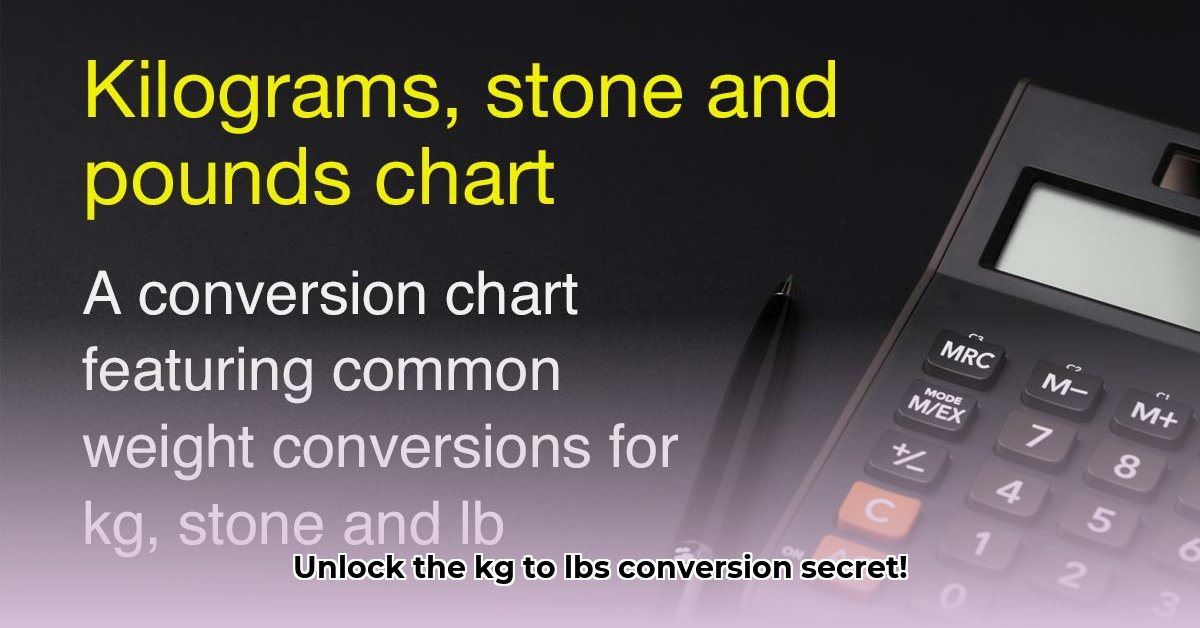
Need to convert 0.3 kilograms to pounds quickly and accurately? This guide provides a step-by-step process, explores potential pitfalls, and offers multiple solutions for both everyday and scientific applications. We'll cover everything from simple calculations to the nuances of mass versus weight, ensuring you achieve the right level of precision for your needs. For more detailed examples, see this kg to lbs conversion guide.
0.3 kg to lbs: The Conversion
The fundamental conversion from kilograms (kg) to pounds (lbs) involves multiplying the kilogram value by approximately 2.20462. Therefore, for 0.3 kg:
0.3 kg * 2.20462 ≈ 0.661386 lbs
This means 0.3 kilograms is roughly equal to 0.661386 pounds. However, the appropriate level of precision depends on the context of your conversion.
Instructional Guide: Multiple Conversion Methods
Here are several methods for converting 0.3 kg to lbs, catering to different needs and levels of precision.
1. Manual Calculation Using a Calculator:
- Input: Enter 0.3 into your calculator.
- Multiply: Multiply 0.3 by 2.20462.
- Result: The result will be approximately 0.661386 lbs.
- Rounding: Round to the appropriate number of decimal places based on the context. For baking, 0.66 lbs might suffice; for scientific research, more precision may be necessary.
2. Utilizing Online Conversion Tools:
Many websites offer kilogram-to-pound converters. However, ensure the website's reliability before using it. Verify results with alternative methods or by performing the calculation manually. Look for sites that transparently display their calculation methods and rounding procedures.
3. Spreadsheet Software (e.g., Excel, Google Sheets):
For repeated conversions, spreadsheets provide efficiency. Use the formula =A1*2.20462, where 'A1' refers to the cell containing the value in kilograms. This automates the conversion, reducing manual effort and the risk of errors.
Delving Deeper: Accuracy and Contextual Considerations
The accuracy required for kilogram-to-pound conversions varies. A slight discrepancy is acceptable when baking a cake; however, scientific experiments demand extreme precision.
Mass vs. Weight: A Clarification
While often used interchangeably, mass and weight are distinct. Kilograms measure mass (the amount of matter), while pounds measure weight (the force of gravity acting on the mass). On Earth, the difference is negligible for most everyday applications, but in other gravitational fields (e.g., on the moon), the distinction becomes critical.
Precision and Significant Figures
The number of significant figures (digits that carry meaning) in your answer should reflect the precision of your initial measurement and the requirements of your application. Using more significant digits reduces errors.
Avoiding Common Errors
- Unreliable Online Tools: Use established and trustworthy online converters.
- Rounding Errors: Ensure appropriate rounding based on the context. Avoid premature rounding during calculations.
- Confirmation Bias: Verify your results using a second method or tool.
Conclusion: Choosing the Right Approach
Converting 0.3 kg to lbs is straightforward, but accuracy hinges on selecting the optimal method and understanding the necessary precision. Choose the conversion method based on your needs – a simple calculator for quick results, online tools for convenience, or spreadsheet software for bulk conversions and enhanced precision. Always double-check your results for accuracy and reliability.
Further Resources
- NIST Guide to SI Units: Learn more about the International System of Units (SI) and unit conversions. (While not directly related to kg/lb conversion, this resource offers broader context on units of measurement)